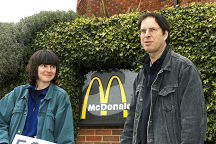
April 15 marked the 40th anniversary of the opening, in Des Plaines, Illinois of the first McDonald’s Hamburger Corporation restaurant. Helen Steel and Dave Morris, defendants in the United Kingdom McDonald’s libel trial, flew to the U.S. to join an alternative, anti-birthday celebration in the Chicago suburb.
About 40 demonstrators marched at the facility which is now a museum and maintained as it was in 1955 when the junk food king had only sold “millions and millions.” The group shouted slogans and carried signs charging McDonald’s with exploitation of people, animals and the environment.
It is these contentions which, back in England, led the giant corporation to bring a libel complaint against the two environmentalists who have been associated with the ten-year London Greenpeace campaign against McDonald’s. Under British libel law, which heavily favors the plaintiff, McDonald’s has for years been able to silence its critics, but Steel and Morris decided to take on the company and are involved in the longest libel trial in British history. They have been in court since last June and the case may go until the Fall.
McDonald’s had planned a gala anniversary festival and to open their Des Plaines landmark to the public, but when learning of the planned demonstration, canceled all events and refused comment to the media.
Earlier in the day, picketers demonstrated at a downtown Chicago McDonald’s where Helen and Dave smashed a large birthday cake adorned with 40 candles. The 15th was designated an International Day of Protest against McDonald’s and the McLibel case which saw demonstrations in at least 20 countries as far flung as New Zealand, Poland, and Croatia and Royal Oak, Michigan. In England alone; over 100 restaurants were picketed. Also, 120,000 leaflets were distributed in the UK and some people returned bags of McDonald’s litter to the company as part of an “Operation Send It Back” campaign.
In the Czech Republic, 150 people marched through downtown Brno, handing out leaflets after which a benefit with five bands was held. In Finland, protests were held in Helsinki, Tampere, Lahti, Vantaa and Kyvaskyla. In Helsinki, 250 people picketed the city’s six McDonald’s.
Under a banner reading, “Bloody Birthday, McDeath,” activists from The Animals’ Voice, Mut-Menschenrecht and Tierrecht and Naju-Nuturschutzjugend demonstrated for 10 hours at the Dieburg [Germany] McDonald’s. The manager tried to bribe them into silence with offers of free Big Macs and Cokes, but “No Chance, Mr. Big Mac,” came the reply.
Demonstrations in Spain were held along the Ramblas in Barcelona as well as in Alicante, Valencia, Madrid, Valladolid and Mallorca.
In Chicago, the media asked the two defendants why they had come to the corporate headquarters of their tormentors. Morris replied, they “were simply returning the favor,” since so many McDeath executives had come to London to testify against them.
“This case wouldn’t have lasted two minutes in the States,” he said.
After a three-week recess which allowed for the U.S. jaunt, the trial resumed with a focus on the defendants’ contention that the company exploits labor. As has been the case all along, McDonald’s witnesses turned out to be a disaster for the company. Helen and Dave grilled Sid Nicholson, former McDonald’s employment chief, who agreed that wages at the chain begin at the legal minimum, but defended it as adequate pay.
He admitted that all trade union activity is banned and even talking to a union representative about conditions at a restaurant is considered “gross misconduct” and grounds for instant dismissal. Next up, Dave and Helen will be questioning Robert Beavers, McCancer Senior Vice-President from Chicago, about the company’s business practices and ethics and the decision to bring the case against them.
The latter line of questioning should be revealing since both legal corporate observers are wondering why the giant corporation brought a relatively obscure campaign into the light of international attention. Newspapers which previously never dared air criticism of the litigious company, now gleefully report every development in the courtroom. One observer said, “McDonald’s had a hornets’ nest of sorts with the relentless Greenpeace campaign, but they brought the nest inside the house and then beat it with a stick.”
The need for pressure on McDonald’s continues. Demonstrations at their restaurants and fund raising and donations for the McLibel Support Campaign, at 5 Caledonian Rd., London N1, England, are of a high priority. Please send them reports of all actions.
